ISO 7899-2 Enterococci Test in Groundwater
The ISO 7899-2 standard provides a robust framework for the detection and quantification of enterococci in water, which is critical for ensuring the safety and quality of groundwater. Enterococci are Gram-positive bacteria that are often used as an indicator organism to assess the presence of fecal contamination in surface waters and groundwaters.
The standard specifies methods for culturing enterococci using m-Endo agar (or other suitable media) under specific conditions, followed by enumeration or detection. This testing is particularly important in environmental monitoring because it helps identify potential sources of contamination from human activities such as wastewater discharge, agricultural runoff, and urban stormwater.
At Eurolab, we utilize advanced microbiological techniques aligned with ISO 7899-2 to provide accurate and reliable results for our clients. Our testing process begins with the collection of water samples from various depths within an aquifer or groundwater system. These samples are then processed according to strict protocols that ensure minimal contamination during sampling and transportation.
Once received at our laboratory, the specimens undergo a series of steps including dilution, inoculation onto m-Endo agar plates, incubation under optimal conditions, and final enumeration using colony-forming units (CFUs). Our microbiologists meticulously count the colonies to determine the concentration of enterococci present in each sample.
The results are reported according to ISO 7899-2 guidelines, providing clear numerical values that reflect both the presence and levels of enterococci. This information is invaluable for stakeholders involved in water resource management, environmental protection, public health initiatives, and regulatory compliance programs.
Our commitment to accuracy extends beyond just meeting standards like ISO 7899-2; we also stay abreast of any updates or amendments that may impact our testing methods. By adhering strictly to these protocols, we ensure consistent and reliable outcomes for all clients seeking assurance about their groundwater quality.
Why It Matters
The significance of detecting enterococci in groundwater cannot be overstated as it serves as an early warning system against potential health hazards associated with contaminated water resources. The presence of these bacteria indicates the possibility that other pathogens could also be present, which underscores the necessity for thorough testing.
Groundwater is a vital resource worldwide, supplying drinking water for millions of people across different sectors including agriculture and industry. Ensuring its purity not only protects human health but also supports sustainable development goals by safeguarding ecosystems dependent on these aquifers.
In addition to protecting public health, compliance with ISO 7899-2 plays a crucial role in meeting regulatory requirements set forth by environmental agencies such as the U.S. Environmental Protection Agency (EPA), European Union regulations, and national standards like EN ISO 16642. Adhering to these norms helps organizations avoid penalties while enhancing their reputation for responsible stewardship.
The findings from our enterococcus testing can guide remediation efforts aimed at improving water quality or preventing future contamination incidents. By identifying the specific sources of pollution, stakeholders can implement targeted measures to mitigate risks effectively. This proactive approach fosters trust among consumers and contributes positively towards sustainable practices in agriculture, urban planning, and industrial operations.
Eurolab Advantages
At Eurolab, our expertise lies not only in adhering meticulously to international standards but also in delivering exceptional service tailored specifically for clients operating within the environmental sector. With years of experience behind us, we have developed a comprehensive understanding of what it takes to meet stringent requirements set by organizations like ISO.
We pride ourselves on offering flexibility when it comes to sample submission - whether you need routine monitoring or one-off assessments, our team is equipped to handle various scenarios efficiently. Our state-of-the-art facilities and highly trained professionals ensure that every step of the testing process adheres strictly to best practices outlined in relevant standards.
A key advantage of choosing Eurolab for your enterococcus testing needs includes our ability to provide rapid turnaround times without compromising on quality. This allows you to receive timely reports which can then be used immediately for decision-making purposes related to resource management strategies or compliance audits.
Moreover, we offer detailed analytical insights beyond mere quantitative results by incorporating additional data points such as temperature variations during sampling, pH levels of the samples, and other relevant parameters that influence microbial growth rates. This holistic approach ensures comprehensive understanding of each sample's characteristics.
Customer Impact and Satisfaction
Our clients benefit greatly from Eurolab's specialized enterococcus testing services in several ways:
- Regulatory Compliance: Ensures adherence to local, national, and international regulations related to water quality.
- Risk Management: Identifies potential risks early on through accurate detection of contamination sources.
- Sustainable Operations: Supports long-term sustainability initiatives by providing reliable data for informed decision-making processes.
- Enhanced Reputation: Demonstrates commitment to maintaining high standards of environmental stewardship, thereby enhancing corporate reputation and market position.
We aim to exceed expectations by delivering consistent quality and exceptional service. Positive feedback from satisfied customers attests to our dedication in providing precise results that contribute significantly towards achieving desired outcomes across diverse industries.





